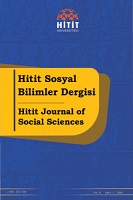10 YAŞ GRUBU ÖĞRENCİLERİNİN FİNANSAL OKURYAZARLIK EĞİTİMİ İLE TÜKETİM VE TASARRUF DAVRANIŞLARI ARASINDAKİ İLİŞKİNİN ANALİZİ
The Relationship between the Financial Literacy Education and Consumption and Saving Behavior of 10-Year-Old Students
Author(s): Salim ŞENGEL, Serpil Altinirmak, Hüseyin YOLCU, Şirin ŞENGEL, Taylan AKGÜL, Basil OkothSubject(s): National Economy, School education, State/Government and Education, Socio-Economic Research, Sociology of Education
Published by: Hitit Üniversitesi
Keywords: Financial literacy; financial education; financial education for children; saving; consumption;
Summary/Abstract: We live in an age that requires children, just like adults, to make the right decisions in an increasingly complex economic system. It is the common view of many researchers that providing children with financial knowledge and skills is a critical and urgent need if the children are to make the right financial decisions. There are many factors like gender, race, age, level of education, etc. that should be considered when preparing a financial education program for children. It is also important that the educational programs be structured in a way that includes financial knowledge and skills that children can use throughout their lives. We believe that, through early exposure to the right consumption habits and savings awareness, we can contribute to the development of our country. The aim of this study is to determine the relationship between the financial literacy education given to 10- year-old students and their consumption and saving behaviors. In the study, a study group was formed from 122 4th -grade students from Mustafa Kemal Primary School, Dumlupınar Primary School, and Şehit Mustafa Türker Primary School in the two central districts (Tepebaşı and Odunpazarı) of Eskişehir province. The research was conducted as a quasi-experimental study in which experimental and control groups were formed in all three schools. The experimental groups received a total of 300 minutes (10 modules) of training based on the financial literacy training modules prepared by the researchers. At the end of the study, it was observed that the knowledge and skills of the students in the experimental group on financial literacy education and consumption and savings issues increased.
Journal: Hitit Sosyal Bilimler Dergisi
- Issue Year: 15/2022
- Issue No: 2
- Page Range: 489-505
- Page Count: 17
- Language: Turkish

